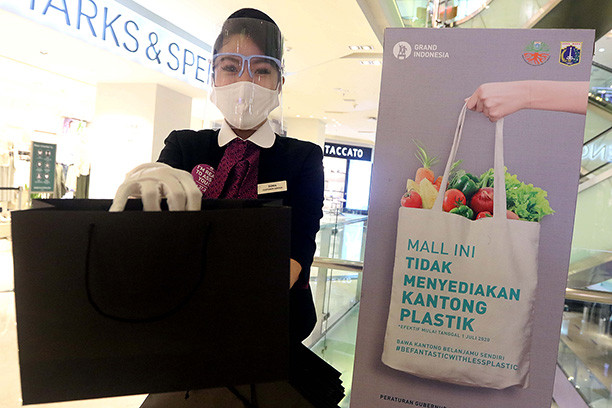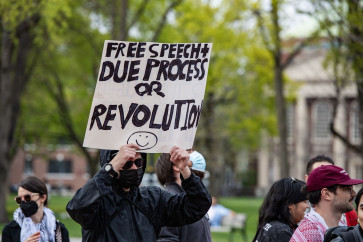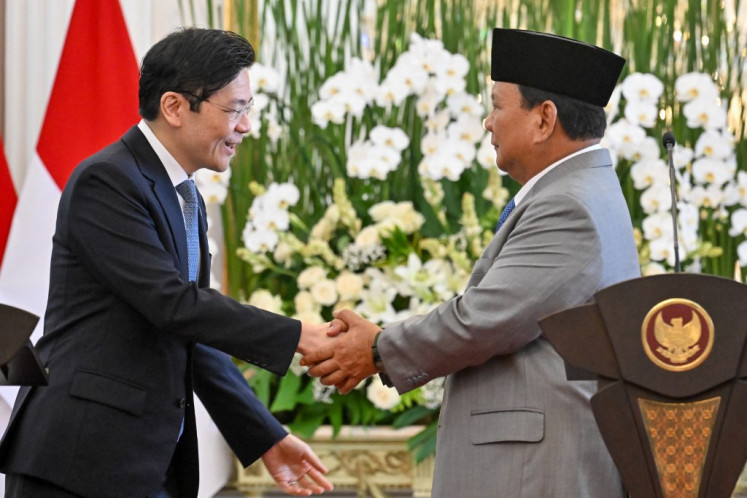Jakarta’s ban on plastic bags still has holes
Change text size
Gift Premium Articles
to Anyone

T
wo months into Jakarta’s plastic bag ban, the policy has yet to yield optimal results, environmentalists have said, urging the administration to step up monitoring of its implementation.
Regi Risman, 28, hesitantly accepted a plastic bag from a fruit seller at the Mencos traditional market in South Jakarta this month.
“I asked the seller why she was still using single-use plastic bags. She simply said it was okay to use them,” Regi told The Jakarta Post on Monday. “She probably didn’t know about the ban, or no one has warned her to comply with the new policy.”
During his visit to the market, two other vendors selling warm food and household appliances also offered Regi plastic bags, but he declined.
As someone who has been aware of the ban for the past two months and almost always carries his own reusable shopping bags, Regi said authorities needed to continue reminding traders and shoppers to stop using single-use plastic bags.
“There are people who oppose the ban and ask traders why they don’t give them plastic bags. I think they don’t want to pay extra money to buy reusable shopping bags," he said.
Although some sellers at Mencos traditional market do not comply with the ban, Regi said a number of convenience stores and retail chains in shopping malls in South Jakarta no longer provided free plastic bags, but sold reusable shopping bags instead.
The Jakarta administration has banned single-use plastic bags in traditional markets, modern supermarkets and minimarkets since July 1 after the singing of gubernatorial regulation that was years in the making. The plan was initiated in 2018, but was immediately put on hold when Governor Anies Baswedan wanted to include a provision on substitute materials to replace plastic bags.
The regulation serves as the legal basis for requiring the sale of eco-friendly bags in stores and markets and carries punishments for shopping centers found to violate the ban on single-use plastic bags, which range from written warnings and fines to suspension or termination of permits. However, it does not stipulate punishments for shoppers.
Environmentalist Tubagus Soleh Ahmadi of Indonesian Forum for the Environment’s (Walhi) Jakarta office said his group had followed the implementation of the ban closely and had found that, by and large, businesses had complied.
“A few business still provide plastic bags, despite the ban being publicized for six months before taking effect. The authorities have not monitored implementation of the regulation optimally,” he said on Monday.
Head of the Jakarta Environment Agency’s monitoring unit, Wishnu Widhiana, said that the majority of shopping malls, supermarkets and minimarkets had complied with the ban.
“[The point to highlight] is the lack of promotion by traders to their customers about the positive sides of using more eco-friendly bags and the negative sides of using single-use plastic bags,” he said in a written statement on Monday.
Tubagus said there had been a lack of education on the environmental impacts of disposable plastic bags through public information campaigns.
People in Jakarta seem to be familiar with the practice of using reusable shopping bags, but without knowing how it benefitted the environment, said Muharram Atha Rasyadi from Greenpeace Indonesia.
He said that public campaigns should also provide information on bioplastics – often seen as an alternative to petroleum-based plastics – as they were as harmful as regular plastics.
The gubernatorial regulation defines single-use plastic bags as transparent bags made from various kinds of plastics, including polyethylene and thermoplastics. It states that eco-friendly bags can be made of leaves, paper, cloth or recycled materials, as well as polyester and its derivatives. The bags must be recyclable and reusable.
Despite being plant-based, Atha, citing a 2015 United Nations Environment Program (UNEP) report on biodegradable plastics and marine litter, said that bioplastics were slow to biodegrade.
The biodegradation rate of bioplastics is largely dependent on environmental conditions, such as temperature and humidity, the report states. It concludes that the adoption of “biodegradable” plastics would not result in a significant decrease in production of plastic waste and marine litter.
Fajri Fadillah from the Indonesian Center for Environmental Law (ICEL) said that bioplastics would likely be used only once, undermining the purpose of the ban to reduce the generation of plastic waste.
Each day, 7,700 tons of trash from Jakarta is dumped into the Bantar Gebang landfill in Bekasi, West Java. The landfill is projected to hit full capacity next year.
“Banning single-use plastic bags is just one step. The Jakarta administration and the City Council must now focus on bolstering waste reduction efforts. Plastic packaging for our personal care products, for instance, are not included in the regulation,” said Fajri.
He also urged authorities to encourage households to sort their trash before collection to improve waste management.









